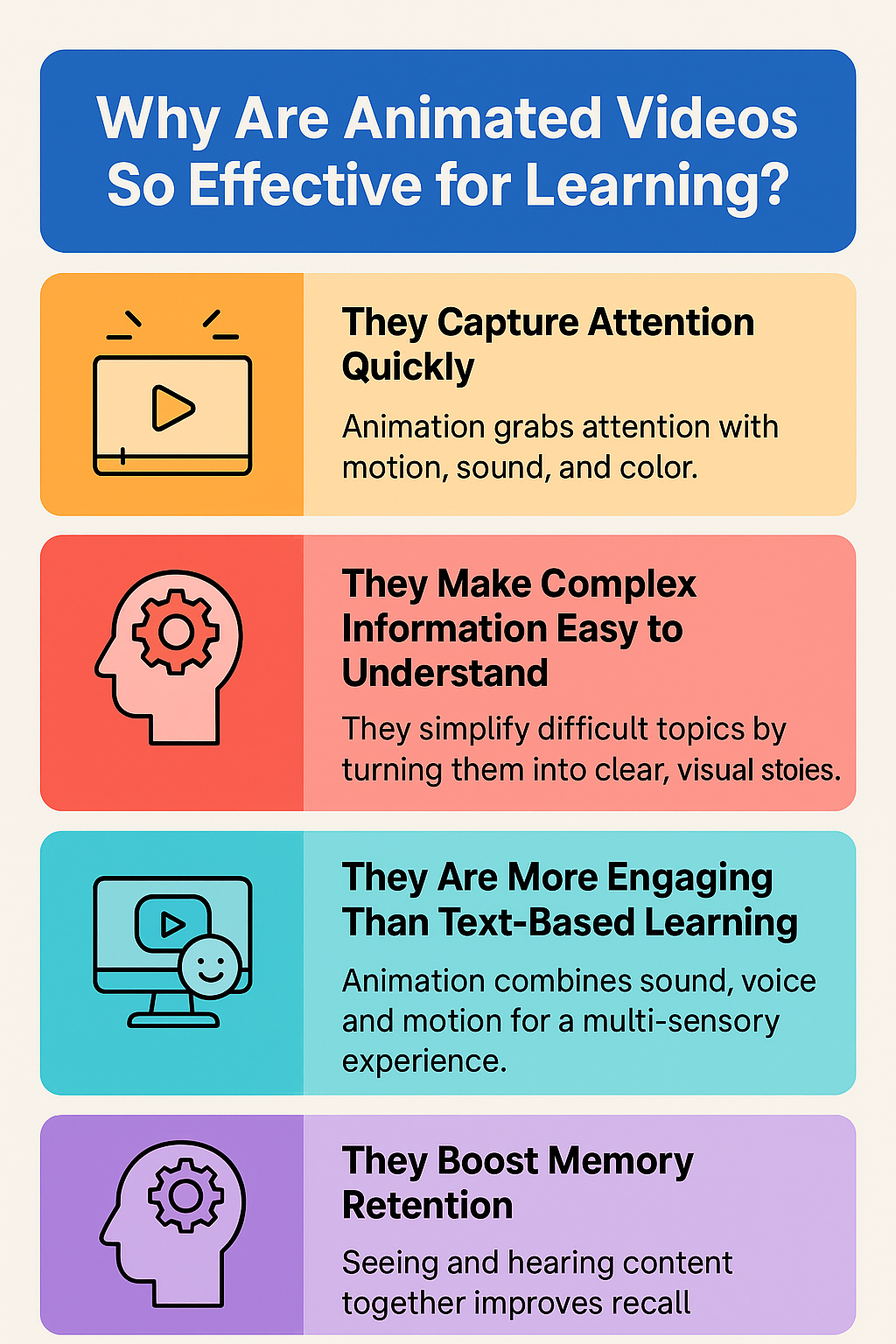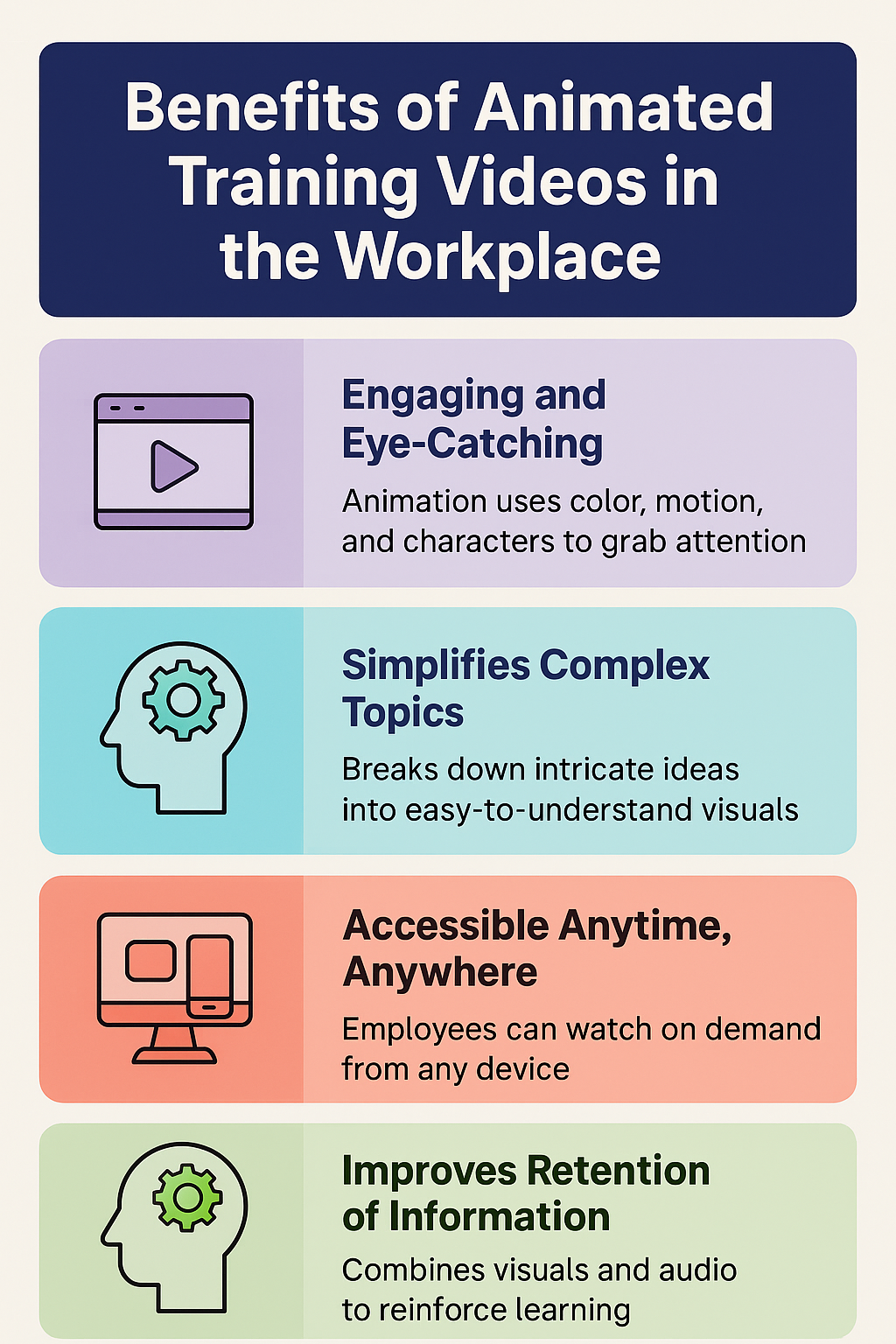May 31st, 2025

Training employees is essential for building a strong and successful company. But let’s face it—traditional training methods like thick manuals and long lectures are often boring and forgettable. That’s where animated training videos come in. They are fun, engaging, and surprisingly effective. In fact, many companies now use animated videos to train employees because they improve learning outcomes and boost knowledge retention.
In this blog, we’ll explore why animated training videos are powerful tools for employee development and how they can improve learning and retention rates.
Animated training videos use visuals, voiceovers, music, and motion graphics to deliver training content. Instead of showing real-life footage, they use animated characters, symbols, and text to explain concepts. These videos can be short explainer videos, step-by-step guides, scenario-based learning modules, or storytelling animations.

Let’s break down the main reasons why animated videos work better than traditional methods:
Employees are often busy and distracted. Animated videos grab their attention within the first few seconds using motion, sound, and colorful visuals. According to Forrester Research, people are 75% more likely to watch a video than to read documents or emails.
Some topics are hard to explain using just text or speech. Animation allows you to visualize complex ideas. For example, you can show how a software process works or how safety procedures should be followed. Animation makes the abstract feel concrete.
Reading manuals or PDFs can be dull. Animated videos include sound, voice, and motion, which creates a multi-sensory learning experience. This keeps the learner engaged longer and helps with focus.
When people see and hear something together, they are more likely to remember it. This is backed by The Cognitive Theory of Multimedia Learning by Richard Mayer, which shows that combining visuals and audio improves recall. Employees are more likely to remember what they learned through animation than text or lectures.

Let’s look at some key benefits of using animation for employee training:
Research shows people remember 80% of what they see and do, but only 20% of what they read. Animated videos show employees how to perform tasks, not just tell them. This hands-on learning approach leads to better results.
Videos deliver the same message every time, unlike in-person trainers who may explain things differently. This means every employee gets the same quality of training.
Once created, animated videos can be used over and over again. You don’t need to pay for trainers or schedule multiple sessions. Plus, employees can watch them anytime, saving time for everyone involved.
Need to make a change? No problem. Animated videos can be edited and updated quickly. This is especially useful for compliance training or product updates.
With more companies going remote, animated videos can be shared online or through learning platforms. Employees can learn whenever it suits them—whether they’re working in the office or from home.
Google, one of the world’s top companies, uses animated videos for internal training. According to Think With Google, using video-based microlearning improved their training efficiency and reduced onboarding time significantly.
A 2022 study by Training Industry found that learners who used animation-based modules had a 35% higher retention rate than those who used traditional text.
According to the Harvard Business Review, employees prefer video-based learning over text by a margin of 60%.
The E-learning Industry also supports this, stating that animated videos can increase learner engagement by up to 90% in corporate training programs.
Animated videos work best in these types of training situations:
Employee Onboarding: Introduce company policies, tools, or culture with ease.
For compliance training, animations help explain rules, safety steps, and legal guidelines in an easy-to-understand way.
Product Training: Explain product features or services visually.
Soft Skills Training: Use stories and scenarios to teach leadership or communication.
Planning to make animated training videos? Here are some helpful tips to get you started:
Stick to one concept per video. Short videos (2–5 minutes) are easier to digest.
Voiceovers should be clear and friendly. Adding subtitles helps people follow along, especially if English is not their first language.
Add questions, quizzes, or clickable options to keep learners engaged.
Use tools like Vyond, Powtoon, or Animaker to create high-quality animations. You can also hire professionals for better results..
When uploading animated videos to WordPress, make sure they are SEO-friendly using the Yoast plugin. Here’s how:
Use your target keyword like “animated training videos” in:
SEO title
Meta description
First paragraph
Headings (at least one H2)
Alt text of video thumbnail image
“Discover how animated training videos can boost employee learning and retention. Learn why companies use animation for effective staff training.”
Internal link to your company’s training page or LMS platform
External links like:
Use a plugin or Yoast’s schema feature to label the page as an Educational Article or How-To.
Animated training videos are no longer just a trend—they are the future of workplace learning. They help employees learn faster, remember longer, and stay engaged. Whether you’re a small business or a large corporation, using animation in your training strategy can lead to better results and happier employees.
So if you’re still relying on boring PowerPoints or old manuals, now is the time to upgrade your training with animated videos.
Training employees is essential for building a strong and successful company. But let’s face it—traditional training methods like thick manuals and long lectures are often boring and forgettable. That’s where animated training videos come in. They are fun, engaging, and surprisingly effective. In fact, many companies now use animated videos to train employees because they […]
Fill out the form below and we will send you a quote today…